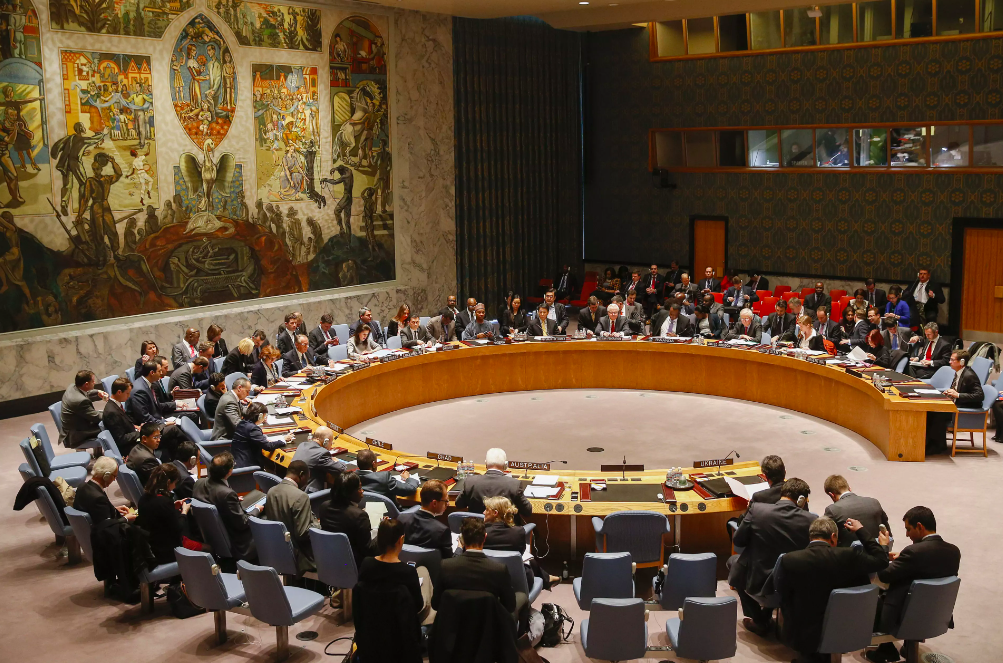
The veto power afforded to the five permanent members of the United Nations Security Council (China, Russia, the United States, France, and the United Kingdom) has long been criticized for frustrating the organ’s task of ensuring international peace and security. Article 27(3) of the United Nations Charter enables any of the permanent members (the P5) to instantly void a non-procedural resolution by casting a negative vote. This ability for a single state to overturn calls for action against even the most heinous human rights violations has made it difficult for the Security Council to properly handle such abuses. This article will examine how veto powers and human rights violations intersect, the legality of this veto power, and current initiatives working to repair the veto’s shortcomings.
Permanent members routinely use their veto power to stop resolutions concerning human rights violations that conflict with their national interests. For instance, Russia regularly uses its veto to defend its Syrian ally against attempted UN action. By February of 2017, Russia had used its veto for the seventh time on the matter. While invoking a veto is simple, the consequences can be devastating. Just a month after Russia’s veto, Syria launched a new chemical attack that killed 80 people.
Veto powers also make human rights issues less visible. The mere threat of a veto can hinder a resolution before it is even drafted, as international lawyers and ambassadors are hesitant to deploy resources towards a “futile” action. Such is the case for the Rohingya genocide, which has yet to be discussed by the Security Council due to anticipated Chinese and Russian vetos. Issues of human rights breaches must be internationally broadcasted to ensure an adequate response. Instead, the veto forces such abuses to be swept under the rug.
The problem is not just Russia. Other P5 states also veto questions surrounding human rights violations. The United States ranks second in total veto uses, having used the tool 82 times. Although the Security Council has a clear ability to act as a powerful force in upholding global human rights, the usage of the veto complicates its ability to deal with violations of international law.
In the context of these shortcomings, the veto power seems to walk a thin line of legality within international law. Firstly, vetoing resolutions against human rights abuses may be contrary to the UN’s charter, as Article 24 directly tasks the Security Council with “maintaining international peace and security” with “prompt and effective action.” Since the prevention of human rights violations (particularly in cases as grave as genocide) often concern “international security,” the usage of a veto threatens the P5’s Charter mandate and prevents “prompt and effective” response. Furthermore, although Article 2(1) sets out that all states are “sovereign equals,” Article 27(3) effectively acknowledges that some states are superior to others by bestowing just five nations with veto powers. While denying the superior economic or political influence of certain states would be denying abject reality, it is questionable whether this power should allow these states to single-handedly halt an international call for action.
Secondly, when resolutions concerning human rights violations are vetoed, it can directly breach international treaty obligations. For instance, Article 1 of the Genocide Convention calls upon all signatory states to prevent genocide. The International Court of Justice’s judgment also clarified in Bosnia v Serbia that states have an obligation to prevent genocide. As a result, vetoing a resolution dealing with genocide violates a P5 state’s legal mandate to prevent these crimes. In addition, one member’s veto may push other Security Council nations into an indirect breach of their own obligations, as they are forced to remain inactive in preventing such injustices by the veto.
Lastly, veto powers can act contrary to jus cogens, which refers to an established norm within international law prohibiting certain behaviours. Article 41(2) of the International Law Commission’s Articles on the Responsibility of States for Internationally Wrongful Acts makes it illegal for states to support or deem lawful any actions that are against such peremptory norms. Importantly, the severe violation of human rights, such as in the context of genocide, is viewed by the international community as being prohibited by such norms. Therefore, when a resolution dealing with a state’s abuses of human rights is vetoed, the veto is essentially aiding the continuation of jus cogens violations. It is of course questionable whether individual vetoes do indeed reflect a nation’s support of legal human rights abuses. However, at minimum, it does demonstrate that the respective state is not doing everything in its power to halt violations of jus cogens.
Due to these issues, an increasing number of UN states are calling for the veto power to be reexamined. Mexico and France have been leading an initiative,supported by most UN states, calling for the P5 to voluntarily withhold their veto usage in resolutions dealing with mass atrocities. However, this is not a legally binding tool. The code calls for voluntary withholding in order to make such vetoes more politically costly, rather than adding any real restrictions. Many other initiatives, such as the Accountability, Coherence and Transparency Group’s Code of Conduct, face the same issue: they create “soft law” rather than making the necessary inroads to legally restrict the misuse of veto powers.
Underlying these shortcomings is the international order’s insistence on maintaining state sovereignty. Legally mandating governments to act in a certain way infringes upon this fundamental ideal of the modern state.
However, the very participation of states in the UN should theoretically form a sort of social contract, where they relinquish some of their rights in order to enjoy the benefits of the global institution. As a result, obstructing actions to tackle human rights abuses, for whatever reason the P5 states deem important, are arguably “rights” that must be “sacrificed.” Otherwise, the UN will be unlikely to find a means of balancing sovereignty with the Security Council’s need to maintain global security.





